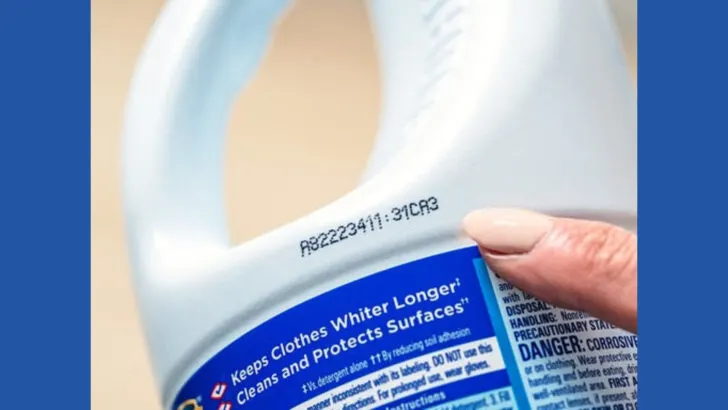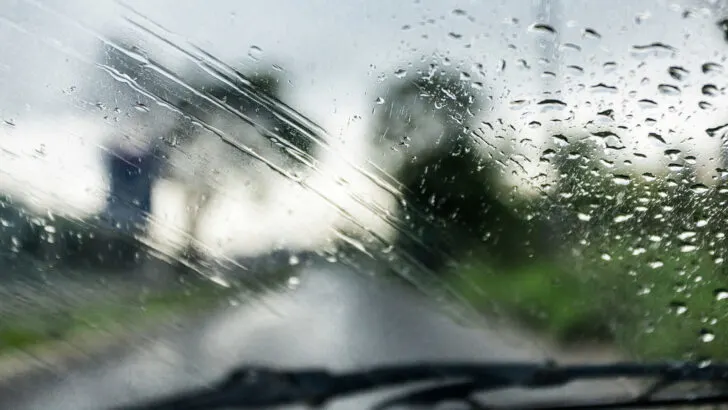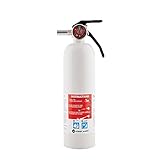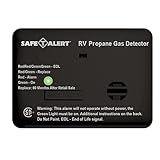We’ve all likely seen articles about “things you didn’t know expire”. Items on most of these generic lists include cleaning products, car seats, bug spray, sunscreen, motor oil, and even hydrogen peroxide.
These articles generally discuss the reasons behind the food and drug administration’s imposition of expiration dates on food items and medications, noting that the latter lose their effectiveness after the expiry date on the bottle.
We’ve even read about a toxic chemical called solanine that builds up in potatoes over time, even if they’re kept in a cool dark environment.
In today’s post, we’re looking at some items generally found in or on an RV that you might not know expire. Many of these items are critical to your safety and that of your family.
We hope this article will enlighten some of our fellow RVers about a few items that might need replacing ASAP to ensure the safety of anyone traveling in their rig!
Items On or In Your RV that Expire
Before we get to our list, we want to note that we’re not including regular maintenance items like motor oil and filters.
While these items may indeed expire over time, we’re pretty sure that most RVers tend to regular maintenance, well… regularly! Therefore, the oil in your rig’s motor and the oil filter, cabin filter, etc., won’t have a chance to expire.
Stay abreast of your rig’s regular maintenance needs by hitting up our posts on RV maintenance and spring cleaning as well as our post on 7 RV maintenance tasks you can easily do yourself.
Now let’s get to our list of 13 things you didn’t know expire on or in your RV!
Fuel (Gas/Diesel)
You may have seen our posts answering the questions, “Does gasoline go bad?” and “Does diesel go bad?”
But if you didn’t, what you need to know is that contrary to a whole lot of anecdotal comments out there, fuel does “expire” (so to speak), though its “shelf life” varies based on a number of factors.
So, yeah…your Uncle John may have had gasoline sitting in his ’65 Mustang for 12 years, and by golly, it started right up… but gasoline and diesel do degrade.

We all know someone who has started up a vehicle or a small machine with old gas in the tank. But the truth is that even if the engine starts, you’re likely to be gumming things up with expired fuel, and this can cause damage to engine components.
The time it takes for fuel to degrade can be influenced by the use of fuel stabilizers and other factors, but it does degrade/expire. Past a certain point, it really shouldn’t be used.
How and where fuel is stored factors into how long it takes for serious degradation to occur.
Additionally, for gasoline, the amount of ethanol in the fuel is a factor (ethanol shortens the shelf life of gasoline), and for diesel, the lack of sulfur in diesel fuel these days is a factor: diesel is degraded by water, air, and warm temperature because of the lack of sulfur in diesel fuel today.
The degradation of gasoline is also influenced by water, evaporation, and oxidation.
And you can start up the ‘ol Mustang or lawnmower if you want, but that old gas will gum up your engine depending on how old it is… mark our words.
That’s why fuel is first on our list of things that expire on your RV!
Engine Coolant
Most people know the importance of changing their RV’s oil (and filters) regularly, but many don’t think about their engine’s coolant.
The additives that help to protect your RV’s (or tow vehicle’s) cooling system get used up and break down over time.
Check your owner’s manual for the recommended time/mileage interval you should use for changing and/or flushing out the coolant.
Tires
You’ll often read about the number of miles a certain manufacturer’s tires are good for, and some are pretty impressive.
But the fact is that RV tires expire more often due to age and sun damage from harmful UV rays, rather than from the number of miles they’re traveled or a loss of tread.
Using a good protective agent on your tires, you can delay the expiration of tires due to sun damage.
- Ultimate Protection – 303 Aerospace Protectant provides superior protection against damaging UV rays. This protector spray repels dust, lint, and...
- Non-Greasy – Dries to a smooth, matte finish with no oily or greasy residue. When treating your outdoor furniture, spa and pool covers, vinyl...
You can also protect your rig’s tires by using good RV tire covers.
There’s a lot you can do to take good care of your tires so they’ll last longer, but you still need to pay attention to the AGE of your RV tires, as we discussed in this YouTube video on tire care:
Propane Tanks
We’ve done a deep dive into RV propane tanks on this blog and among the things we’ve noted is the fact that portable tanks (DOT) have manufacturing dates stamped into their collar and expire after 12 years (10 years in Canada). After that time, they must be inspected, re-certified, and have the new date stamped.
We’ve also written a post answering the question, “Does propane go bad?“, and while the answer is no (the propane itself doesn’t go bad), portable propane tanks do expire, and it’s very important to get them replaced or re-certified to avoid what could become a very dangerous situation.
Fire Extinguishers
Fire extinguishers traditionally have a 10-12 year life expectancy. The portable fire extinguishers (generally the disposable, non-rechargeable kind) that we carry on our RVs should be replaced with a brand new fire extinguisher at least once every 10 years, depending on make & model.
Make no exceptions with this. There’s usually an expiration date marked right on the fire extinguisher. Take it to heart and spend a few bucks on a new one when the expiration date is coming up.
And yeah – we know – people say they’ve used a fire extinguisher they’ve had for 15 years, and it worked. But honestly – it’s not worth testing the theory. They come with an expiration date for a reason.
No one wants to get caught in an emergency with a fire extinguisher that doesn’t have the “oomph” to put out the fire!
- Rechargeable REC5 Recreational Fire Extinguisher is UL rated 5-B: C and has a durable metal head, and is ideal for use in your RV
- Designed to fight flammable-liquid and electrical fires; Uses sodium bicarbonate extinguishing agent
Smoke/CO Detectors
We’re all well aware that the batteries in a smoke detector need to be changed annually at a minimum and earlier if the detector starts beeping to indicate that the battery isn’t sufficient.
But it’s not just the batteries that require replacement. Smoke detectors themselves need to be replaced because the alarm sensors wear out over time, making it so the detector can no longer sense the smoke and alert you to danger.
Smoke detectors have a label on them that tells you the manufacturing date. Smoke detectors should be replaced (at least) once every 10 years, so check the label on your smoke detector (it’s often on the back, so you may need to take it down) to see how old it is.
If your smoke detector doesn’t have a label on it, replace it immediately.
- Dual Ionization Sensing Chamber
- Silence Feature Silences Nuisance Alarms
- The front cover design of the alarm may vary but product function remains the same.
- Battery operated smoke and carbon monoxide alarm can be installed easily
Propane Detector
RV propane detectors are typically hardwired and run off the RV’s house battery bank, so they’re easy to forget.
However, there’s a date label (usually on the back of the unit, so it may need to be removed from the wall to be seen) indicating the unit’s expiration date.
Like smoke detectors, propane detectors are less likely to have the ability to sense a propane leak if they’re expired.
- Double-Duty Alarm Detects Both Gas Leaks And Co Gas Simultaneously
- Reliable 12V Power Means No Missing Or Dead Batteries To Replace. Operating Temperature: minus 40° F To plus 158° F
- Includes mounting bracket
- Power Supply and Current Draw: 12 vDC 75mA @ 12 vDC
If you’re not entirely familiar with your RV’s propane detector (including where it’s located, how it works, how to buy a new one, and how to replace the old one), please take a minute to check out our post, “What Is an RV Propane Detector?“.
In addition, here’s our video showing you step-by-step how to replace your RV propane detector:
First Aid Kits/Supplies
It’s important to remember that antibiotic ointments, analgesics, and other medical treatments lose their effectiveness over time.
Many of the components of your first aid kits and/or RV medicine cabinet may be expired. They should be replaced according to their expiry dates for full effectiveness when you most need them.
Remember, too, that even bandages age. The adhesives break down over time and exposure to heat and cold, and they may also no longer be sterile.
Replace, update, and add to your safety and first aid supplies every year.
Don’t have a first aid kit on board? Pick one up now!
- With Over 9,400 Glowing Reviews, this FSA HSA approved emergency kit will keep you prepared for most common minor injuries or medical emergencies....
- The Most Comprehensive Kit Available: 300 Pieces (40 Unique Items) to prepare for unexpected injuries and emergencies. 1st aid kit for baby & newborn,...
Bleach
This one might surprise you, but even bleach breaks down, and it happens much faster than you may think. The problem with this is that over time, as the bleach deteriorates, it loses its sanitization ability.
So, for example, using an old bottle of bleach to sanitize your fresh water tank may not be doing anything at all if it’s long past its expiration date.
But here’s the thing: bleach’s shelf life is only around (get this) six months!
The active ingredient in bleach is sodium hypochlorite. On its purchase date, the concentration of sodium hypochlorite in bleach is around 6%. If stored at temperatures significantly above or below 70°F, bleach breaks down very quickly.
But even properly stored, the maximum shelf life of bleach is anywhere from 6 months to a year, after which it breaks down by 20% a year. And again, that’s if it’s stored in optimal conditions.
Another important thing to know is that if you store a solution of bleach and water in a container, the active ingredients in the bleach start to break down immediately, and are pretty useless (for sanitizing) within a week!
So that bottle of bleach (or that spray bottle of bleach + water solution) may not be acting as a disinfectant at all!
If you know you’ve had a bottle of bleach around for a long time, you’d do well to dispose of it properly and replace it. If, however, you need to determine the expiration date of a bottle of bleach, you’ll need to decode it a bit because bleach doesn’t have an expiration date marked on the bottle.
If you look at a bottle of bleach, you’ll see two lines with various letters and numbers. The first line represents where and when the bleach was manufactured.

Understanding how to read the date code on a bleach bottle will help you determine when it’s likely to have expired for disinfectant purposes. (Image credit: Clorox)
For example, if the first line of code on the bottle is A82223411, you’ll need to decode that line to determine the manufacturing date. Here’s how you’d do that:
A8 represents the plant where this bottle of bleach was manufactured. You can ignore that.
The next two numbers (22) represent the year when the bleach was manufactured (2022), and the following three numbers (234) represent the Julian date (the numbered day of the year out of 365 total days) when the bleach was manufactured (so the 234th day of 2022).
The final two digits are a shift ID code – you can ignore those as well.
If you want to know what the 234th day of 2022 was, you can use this handy Julian Date Converter.
So, if you’ve got a bottle of bleach that was manufactured on the 234th day of 2022, (August 22, 2022, to be exact!), the technical expiration date will be 6 months from that date. And, if properly stored, your bottle of bleach will probably be effective for a year from that date. Beyond that, it won’t stay good enough for you to rely on.
Here’s a quote directly from Clorox:
“Out-of-date bleach should not be used for any EPA registered disinfecting or sanitizing applications, but it can be used for cleaning. The easiest way to get rid of an out-of-date bottle of bleach is to use it up cleaning toilets.”
We wanted to explain all of that because bleach is one of those items that we all think remains a great disinfectant no matter how long it’s sitting on a shelf.
That’s not the case, so it’s good for all of us to be aware of that, especially if we drink the water from our RV’s fresh water tank. This seems like a good time to bring up our post on the simple truth about how RV water filters work!)
Bleach that has broken down is unlikely to be effective against bacteria, fungi, or viruses.
Important: The disposal of bleach is regulated by the federal government. If you have less than 5 gallons of old bleach to dispose of, you can pour it down the sink or flush it down the toilet if you’re connected to a city sewer system. (Run some water when you do this to further dilute the remaining hypochlorite solution.)
If you have more than 5 gallons of bleach to dispose of or are not connected to a city sewer system, you’ll need to contact a waste disposal company to dispose of the bleach at their facility.
Windshield Wiper Blades

Degraded windshield wiper blades that are ineffective can be a hazard if you can’t see the road well!
Just as with the tires discussed earlier in the post, the rubber blade of our RV’s windshield wipers degrades with long-term exposure to the sun.
This makes the rubber blade stiffer and less effective at its job and is the reason to replace windshield wipers regularly.
Seals
Door seals, slide seals, and any other seals age and tend to deteriorate from prolonged exposure to the elements. This can render them incapable of sealing properly, or can result in rips, tears, and other damage.
This can cause them to stick to the surface against which they’re sealing, or to fail to seal effectively so that leaks develop.
Having seals checked as they age is important to prevent the damage that can occur as they break down over time.
Spare Filters
Here we’re referring to any air, oil, water, hydraulic, or transmission filters, etc., that you may keep onboard your RV as spares.
If they’re kept for long periods of time, especially through temperature extremes, they may ultimately not work well, because the components that make up and hold together the filtering material break down over time.
Baking Soda (in Fridge/Freezer)
This is the least dire of the 13 things you didn’t know could expire in your RV, but we’re including it because no one wants a fridge that stinks!
But if it happens, here’s how to get the smell out of your RV refrigerator!
Are There Other Things You Didn’t Know Expire?
Can you think of any other items that expire in or on your RV? Drop us a comment!
Free RVing Tips, Tricks, Reviews, Giveaways & More
Subscribe to our daily newsletter! We’ve been full-time RVers for 20 years (!) and share everything we’ve learned about RVing in our daily blog posts. Join our online community to receive a wealth of great RVing knowledge delivered right to your inbox.
Whether this is your first time on the road or you’re a seasoned full-timer, you’ll love the wide range of RVing topics we cover. Don’t miss a single article or any of our famous RV gear Giveaways — Subscribe today!









Bruce H.
Saturday 7th of January 2023
Brake fluid should be flushed and changed every 3 years or so. Brake fluid absorbs water which seeps into the system past seals. When the brake calipers or cylinders get heated through repeated use (going down a hill for example), the absorbed water will start to boil and become a gas which is compressible. This leads to a spongy or soft brake pedal and decreased braking power when you need it most.
TheRVgeeks
Sunday 8th of January 2023
Thanks for adding that, Bruce. Brakes are pretty important! ????
John S.
Tuesday 3rd of January 2023
Good morning John & Peter. This was an interesting read - especially #9 Bleach. Now I'm probably the only person within 10 miles able to check the dates on bleach bottles.
TheRVgeeks
Tuesday 3rd of January 2023
LOL! It's a marketable skill, John! ????
Dr. Mike
Tuesday 3rd of January 2023
Another important thing to know is that if you store a solution of bleach and water in a container, the active ingredients in the bleach start to break down within a week.
Try 24 hours. In the hospital, a 10% bleach solution is good for 24 hours from the time of mixing. How can you tell when bleach water has gone bad? It smells really bad, not at all like bleach.
Dr. Mike